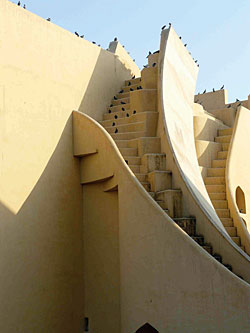 RABI THAPA |
Walking out through Delhi's new airport, all gleaming floors, smartly dressed officials and streamlined procedures (despite the fog and security concerns), you may feel this is, indeed, India Shining. My earliest memory of India as a child flying back from England to Nepal was that of crowds, sticky heat, and flies.
Such lasting impressions are further dispelled as I am smoothly propelled along the motorways to the city centre. In the wintry evening fog, humanity and poverty appear virtually non-existent. Ok, so the pre-paid taxi driver asks me if I mind him making a little extra by putting an extra passenger in the front seat, and the traffic is a little wild (though more regulated than anywhere in Kathmandu) but this is India, after all, and I am getting where I am going.
I hop on to a comfortable bus to Jaipur after an hour in a rather run-down station adjacent to Bikaner House, and the illusion resumes. More motorways viewed through reclining seats supplied with bottles of mineral water, a well-timed break at a food court, and I could be anywhere in the west. Has India really moved on, I wonder, half-admiring, half-resentful.
It's only when we turn into the roads leading into the Pink City of Jaipur that I am reminded the Old India hasn't gone away. Everything appears smaller, shabbier. There are figures huddled around fires, dogs, pigs, cows in clover, in garbage, and there are rows of tempos and rickshaws awaiting our arrival. It's the India of memory. But then a one-star hotel that's almost as good as the five-star hotel I was offered when my flight from Kathmandu was cancelled? I exaggerate, it's true, but at least the Arya Niwas didn't have a cockroach greet me at the door.
The Jaipur Literature Festival was another revelation. All may not have proceeded as smoothly as envisaged, with cancelled speakers, rearranged schedules and long lines for the food and drinks?- but this is common to all festivals across the world, and the organisers juggled the more than 100 sessions and thousands of participants admirably. It was a world-class event.
Jaipur has its fair share of poverty, of course. While Dalit rights and writes were being discussed inside the Durbar Hall of the Diggi Palace Hotel, real-life Dalits sprawled on the urine-stained walks outside the venue. Jaipur has acquired a few fancy malls and brandname stores. But modernity still struggles to overcome conservative mores, with tight-jeaned girls, scarves over their faces, retreating to cavern-like spaces such as the Karan Restaurant to spend quality time with their squeezes.
So the impression just past India's 61st Republic Day is one of impressive advances in infrastructure and a burgeoning middle class in the megacities, well-linked to less impressive provincial cities and, one imagines, much less impressive satellite towns and rural backwaters where the old India is very much present. Clearly, if Kathmandu is a destination for families of Indian beggars, the Indian state is slipping somewhat.
The difference perhaps is that past glory?- in Delhi as much as in the palaces and forts and the remarkable astronomical structures of Jaipur's Jantar Mantar (pictured)?- has not been seen as a be all and end all in Indian cities. These are good for tourists, and the tourist infrastructure has been progressively attended to. But the Indian state clearly has an eye to the future of its citizens as well, even if one does not agree with the state's attitude towards those within and without its borders who do not agree with it.
In contrast, successive Nepali governments seem content to bask in the reflected glory of a World Heritage Site they have done nothing to augment save with a cascade of ugly concrete structures almost totally unsupported by services. All we get are a series of singularly idiotic, unsubstantiated visions: Singapore, Switzerland, Naya Nepal. Here, we just want Kathmandu, Nepal, plain and simple, serviced and serviceable.
READ ALSO:
Jaipur journey?- FROM ISSUE #487 (29 JAN 2010 - 04 FEB 2010)



